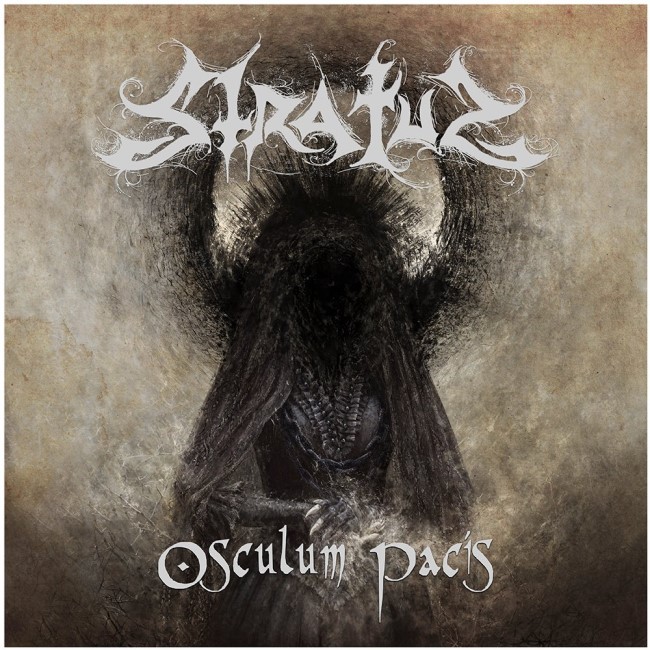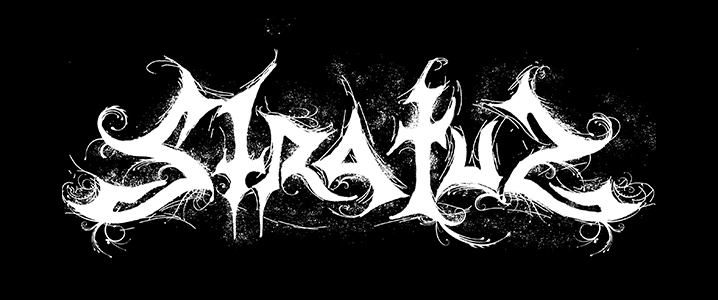
You can support Terra Relicta by donating! Please, do so, and thank you!

Venezuelan, now doom/gothic metal outfit Stratuz has been around for quite some time, since 1984, to be precise. With some genre deviations, line-up changes and a 13-year-long hiatus, the band served four full-lengths and an EP: mainly death metal album In Nomine... (1994), deeply influenced by Scandinavian gothic metal The Last Angel (1999), tasteful death/doom metal Spirit Seduction (2000), an epic cinematic gothic/doom/death EP, Without Original Sin, and only recently the fourth full-length, Osculum Pacis (the review is HERE), which is, in my opinion, a pearl in the Stratuz discography crown. I was talking to the Stratuz's main figure, Franklin Berroterán, who is, besides the bassist Leonardo Rangel, the only original member of Stratuz. It's all here, well, almost all.
Interview with: Franklin Berroterán
Conducted and edited by: Jerneja
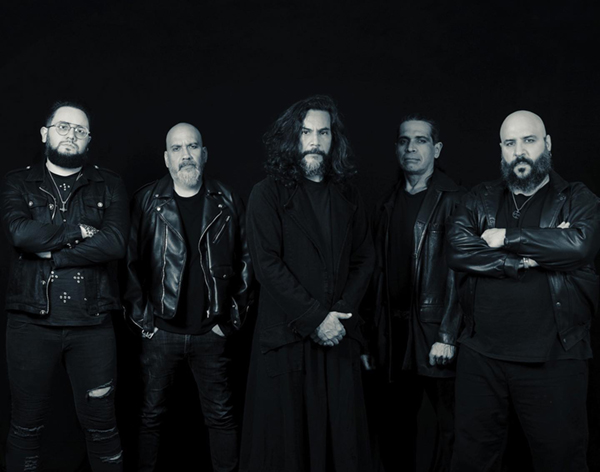 Jerneja: Hello Franklin, and thank you for accepting the interview request. Firstly, congratulations on your recently released Osculum Pacis; Stratuz is finally back, and what a pompous return it is... It's been just over two months since Stratuz's fourth full-length, Osculum Pacis, got released, and it looks like it's already reaping the benefits... But how are you satisfied with the current happening around Osculum Pacis?
Jerneja: Hello Franklin, and thank you for accepting the interview request. Firstly, congratulations on your recently released Osculum Pacis; Stratuz is finally back, and what a pompous return it is... It's been just over two months since Stratuz's fourth full-length, Osculum Pacis, got released, and it looks like it's already reaping the benefits... But how are you satisfied with the current happening around Osculum Pacis?
Franklin: We feel that there is still work to do to feel satisfied; it is a whole process from the conception of the album. We are aware that there are stages, and we must go through each one of them. We'll be satisfied when we see our audience face to face enjoying this long-awaited work.
Jerneja: Has everything regarding Osculum Pacis' delivery been running as expected? Namely, the first two full-lengths, In Nomine... (1994) and The Last Angel (1999), got released independently, the third, Spirit Seduction (2000), via The Last Shivering Planet Company, and now Osculum Pacis via more renowned Sliptrick Records.
Franklin: So far, it has been working, with some logistical delays, but without major risk, as it has been within the expected parameters. We are working on making our work known as much as possible after 22 years without recording a full-length album.
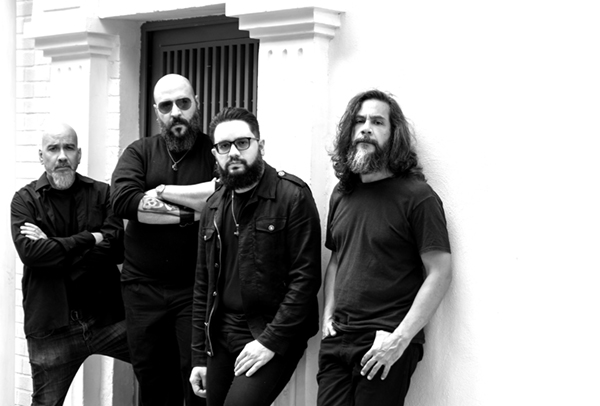 Jerneja: Spirit Seduction (2000) returned to death metal sounds. And, just before Stratuz had disbanded in 2006, it launched the Without Original Sin demo - somehow a cinematic mixture of doom/death/gothic and even black metal, and a little ambient, too. A perfect mixture, may I add. It's hard to comprehend that a band disbands right after it creates something that great. What happened?
Jerneja: Spirit Seduction (2000) returned to death metal sounds. And, just before Stratuz had disbanded in 2006, it launched the Without Original Sin demo - somehow a cinematic mixture of doom/death/gothic and even black metal, and a little ambient, too. A perfect mixture, may I add. It's hard to comprehend that a band disbands right after it creates something that great. What happened?
Franklin: We were very strongly affected by the crisis in our country; the political changes were felt even on our bases. We had many difficulties on a personal and economic level, and this contributed to the painful decision to take a pause. We never knew how long it would take us, but we always met with each other and shared time together, and more than once it crossed our minds to regroup Stratuz, however, they were all failed attempts. In 2015 we tried, and it was catastrophic, in 2016, there was not enough interest, in 2017, when we finally entered the rehearsal rooms to write, absolutely nothing came out; there was no muse, so we decided not to force the return and that it would happen at the right time. It happened in 2019, and, by that time, we even had a roadmap and 100% energy to do something strong but to make everything more entertaining, we got the pandemic, so we decided to go all out to meet our goals, which so far have been achieved.
Jerneja: Then a 13-year-long time-out followed for Stratuz, not for music, though. How was your musical path during this time?
Franklin: As an artist, it is difficult to disengage; personally, I continued working alone, and the rest of the members formed or participated in parallel projects. In my case, I worked for a while with an Italian film director for a trailer for a film, which I don't know if it ever saw the light of day, as I abandoned it due to a breach of contract by the producers, so I continued making songs for personal consumption and for a compilation of a German label which came out approximately 10 years ago, in parallel to this, I dedicated myself to photography to complement my other artistic side, working with important artists as well as film and theatre directors.
Jerneja: Hard times tend to evoke creativity and some inner powers we might not even be aware of them... So, how exactly did this crisis in your country prevent Stratuz? Was there also a direct repression present?
Franklin: The crisis in Venezuela has even reached the moral and ethical level; every crisis brings out two aspects, the negative and the positive, the former being the most highlighted. Stratuz, for years, denounced the direction we were heading, and once we reached that pit, there was no point in denouncing what had already been denounced. Today we've had a lot of experience, and personal growth with so many events that we have gone through, to give details of them would be too long, and we are still in those whirlwinds because the trance is not over.
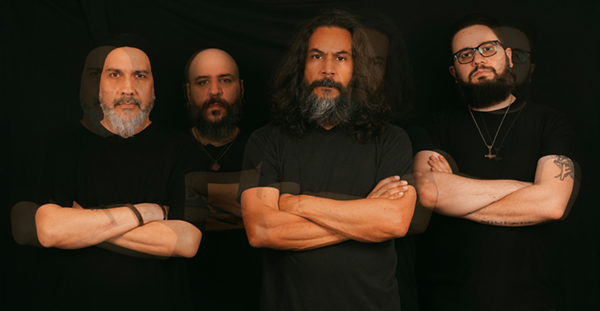 Jerneja: Speaking of Venezuela - not a fertile ground for dark music, I dare to say. Namely, Stratuz is the only renowned band... So, how is the dark music scene there? Perhaps also some comparisons with the times of Stratuz's beginnings...
Jerneja: Speaking of Venezuela - not a fertile ground for dark music, I dare to say. Namely, Stratuz is the only renowned band... So, how is the dark music scene there? Perhaps also some comparisons with the times of Stratuz's beginnings...
Franklin: Venezuela is lagging behind in this genre compared to other countries in the region, however, the country has given birth to exceptional bands with high levels of exportation, but unfortunately, it has not had enough maturity to go further or sustain itself over time. With all that I have experienced in the last twenty years, I feel that there is enough material for bands with very dark and original concepts to emerge, I have noticed a maturity in many aspects that I didn't see before; I feel that despite how far behind we are in comparison with other countries in the region, Venezuela is currently in the capacity to surprise if it so desires.
Jerneja: "Osculum Pacis" means translated from the Latin language "a kiss of peace", the cover art, though, which I find amazing, looks pretty scary; a kiss - first and last - of a praying mantis comes to my mind... So, let's talk about Osculum Pacis' cover art...
Franklin: When we see the kiss of peace ritual within the Catholic Church, as a gesture of peace, reconciliation and union, all its victims throughout its history immediately come to mind, for this reason, when we saw this art by Eugenia Bathoriya, we knew that it fitted perfectly with the title of the album and summarized its content, as we have pointed out, it is the indelible presence of the excesses of the church, of its sins, of its double standards, of its contradictions as an institution and of a profound reflection that should come one day, it is indebted to all its victims.
Jerneja: The kiss of peace (also holy kiss, brother/sister kiss among men/women) is an ancient traditional Christian greeting. Such greetings signify a wish and blessing that peace is with the recipient, and besides their spontaneous uses, they have certain ritualized or formalized uses long established in the liturgy. So, why the Osculum Pacis title? I mean, the lyrics deal with abuses of the church, its deafening silence, summa summarum, great injustice... Is a kiss of peace even possible, if there is no regret in the first place?
Franklin: Fantastic, you hit the nail on the head and the church's double-speak. Your question sums it up!
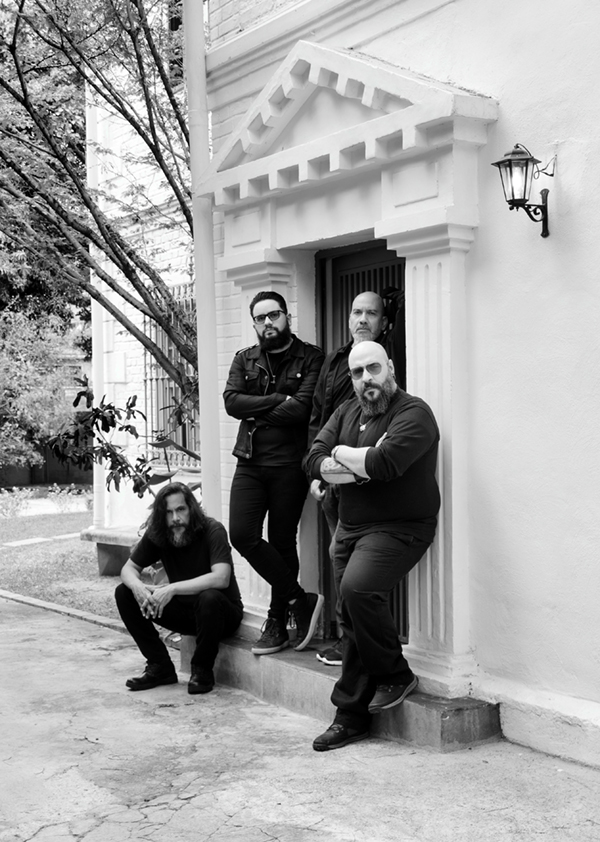 Jerneja: How come you've chosen this delicate subject/theme? Is it something personal in any way?
Jerneja: How come you've chosen this delicate subject/theme? Is it something personal in any way?
Franklin: It was chosen just because it is delicate; what is written often falls asleep in time, whereas in music, it lasts. With the respect to your question of whether it is something personal, in reality, everything that happens in the environment is personal, in an indirect way, because it can happen to oneself or to a loved one; we don't need it to happen to us in first person to denounce, rather we should raise our voice to every act of injustice and give support to the victims.
Jerneja: I've noticed that Lucifer, mentioned in the "Morning Star" track, is written with the capital "F" letter (LuciFer). Is it to emphasize "the one who brings light (enlightenment)" over the common/superficial understanding of Lucifer, or is there another agenda?
Franklin: It is just as you have described, Light Bringer and let us understand light as knowledge. Many are interested in the ignorance of the human being in order to manage it. Knowledge is freedom and power; there is no other way to break the chains but through study and knowledge.
Jerneja: The album begins with "Lux Fer, torment for them, wisdom for the seeker" (namely, the "Intro" track is instrumental) and concludes with "Don't pray for me, I don't want your sky. Don't pray for me, I prefer my hell". I find this conclusion perfect and somehow "ironically correct". But... if we hadn't had to stick with the irony to preserve some meaning in all this nonsense, what would be, in your opinion, the just conclusion of this, as said, delicate subject?
Franklin: Very simple, we must extirpate fanaticism. It has done too much damage throughout history. Unfortunately, the world in the 21st century is submerged in great misery, part of this misery is within ourselves, and we only reflect it through our actions, even coining the phrase "in the name of god".
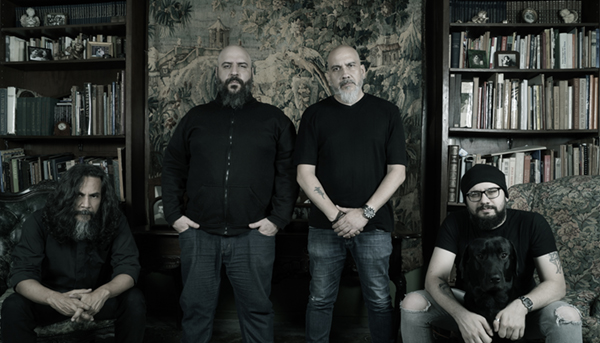 Jerneja: The Osculum Pacis' lyrics are well-sophisticated, and the same goes for the production, especially considering - if I'm not mistaken - that its last two parts, mixing and mastering, were taken care of without any of Stratuz's members being present. So, how was Osculum Pacis done; perhaps also some comparisons with previous releases?
Jerneja: The Osculum Pacis' lyrics are well-sophisticated, and the same goes for the production, especially considering - if I'm not mistaken - that its last two parts, mixing and mastering, were taken care of without any of Stratuz's members being present. So, how was Osculum Pacis done; perhaps also some comparisons with previous releases?
Franklin: The mixing and mastering of Osculum Pacis were done remotely because we hired a sound engineer who lives outside Venezuela. Very possibly - with or without the pandemic - the same thing would have happened. It was new for us since, in the previous albums, all the work got done in the country, but it was not a blind job; the whole process was done in the same way as in person, however, the times were very distant due to the work methodology. With respect to the recording of the album, it was quite similar, and this was motivated by the pandemic, since, due to the restrictions on free circulation because of the sanitary measures, we had to work online. It made us work until late at night and many times until dawn to then meet in person at the guitarist's studio and proceed to record the songs when the sanitary measures allowed it. For us, Osculum Pacis is a very mature work made with a lot of effort, dedication and sacrifice and the relation it might have with the previous albums is the learning acquired during so many years.
Jerneja: Another thing about lyrics - who writes them; and, especially regarding Osculum Pacis being a conceptual album, did music have to conform to them or...?
Franklin: The lyrics were written by myself, and the music should describe the lyrics; we are still working on making the music as descriptive as possible, to the point that it allows the listener to recreate the theme without the need for lyrics as a guide. It is difficult because it will be anchored to the personal experiences of each person, but the interesting thing will be to get as close as possible to this sensory experience.
Jerneja: The "Dawn" track features the soprano voice of Karen Pita. Was a female voice planned already when composing the song, or did it only later occur the song was missing it? And, who is Karen Pita?
Franklin: The female voice was planned as a balancing element, as well as the additional instruments that accompany the composition. Karen Pita is a friend and collaborator of the band, she is an extraordinary artist who masters different arts, she is an integral musician and additionally, she is also a photographer, she has collaborated with us in the filming when we did the streaming, she also collaborated in one occasion as a photographer and at the end, she took part in the song "Dawn" as a guest singer.
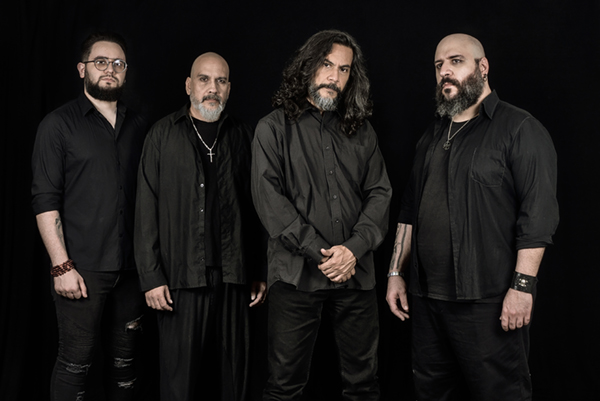 Jerneja: Thank you, Franklin, for this interview, which I'm concluding all by myself - just for a change; I hope you don't mind. I'm familiar with Osculum Pacis having difficulties with "getting incarnated", but hopefully, the CD will be out soon, and all of you, Stratuz's fans, will get a chance to get your "kiss of peace". Stratuz is also about to launch a new video shortly and hit a European tour next year. Be there, and stay tuned to Stratuz, and Terra Relicta, of course!
Jerneja: Thank you, Franklin, for this interview, which I'm concluding all by myself - just for a change; I hope you don't mind. I'm familiar with Osculum Pacis having difficulties with "getting incarnated", but hopefully, the CD will be out soon, and all of you, Stratuz's fans, will get a chance to get your "kiss of peace". Stratuz is also about to launch a new video shortly and hit a European tour next year. Be there, and stay tuned to Stratuz, and Terra Relicta, of course!
Stratuz links: Official website, Facebook, Twitter, Instagram, Bandcamp, YouTube
